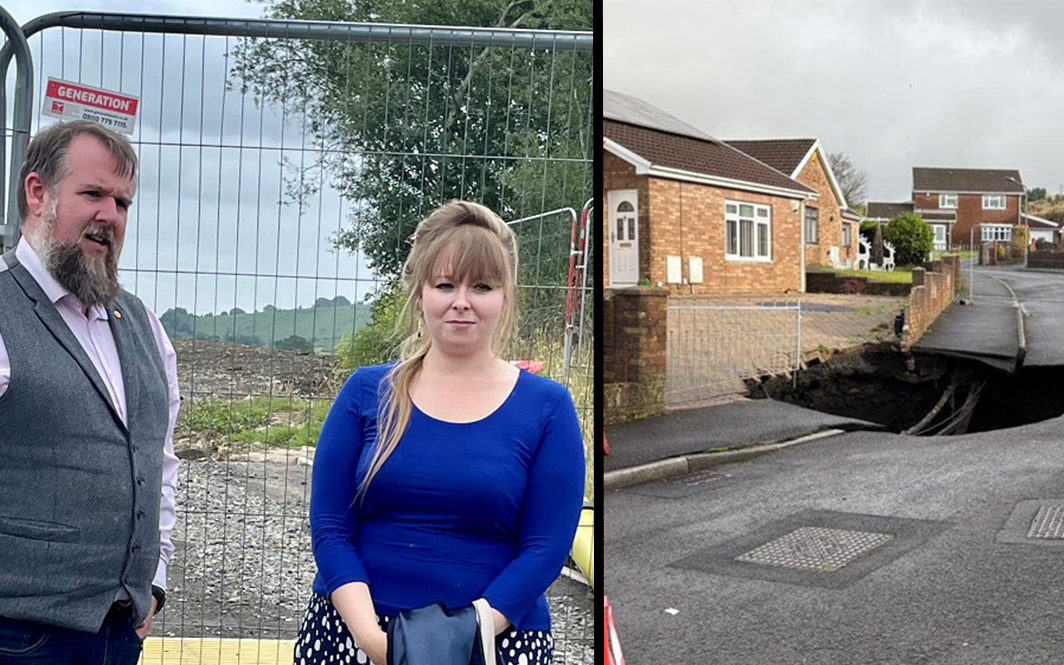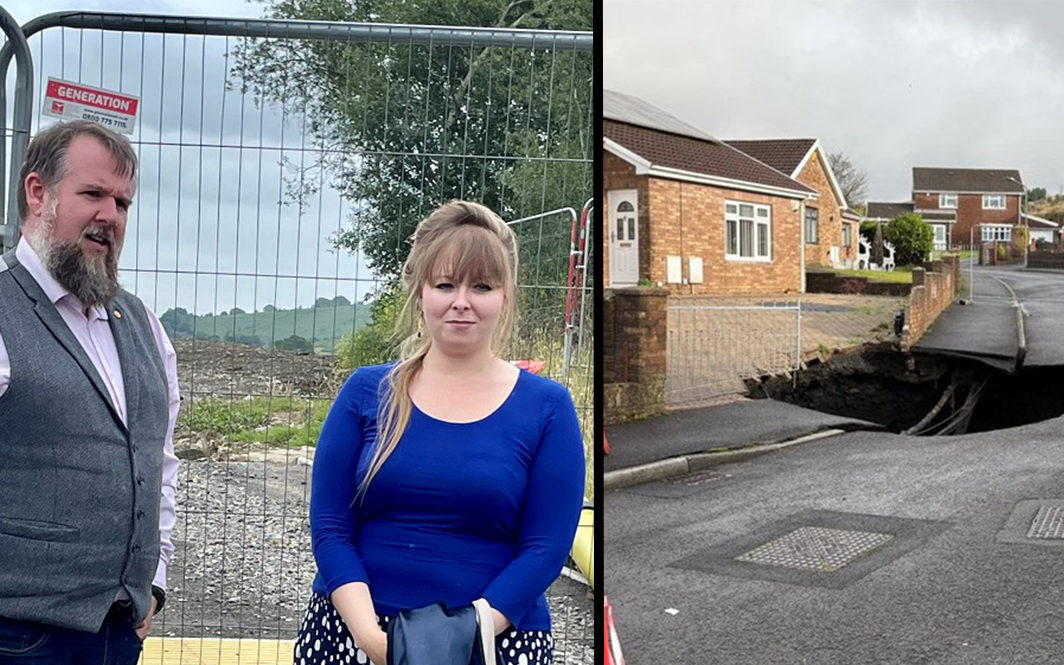 Picture of Plaid Cymru MSs Delyth Jewell and Peredur Owen Griffiths alongside a photo of the sinkhole posted on social media by Merthyr Tydfil council
Picture of Plaid Cymru MSs Delyth Jewell and Peredur Owen Griffiths alongside a photo of the sinkhole posted on social media by Merthyr Tydfil council
South Wales East MSs Delyth Jewell and Peredur Owen Griffiths have today quizzed the Welsh government on the large sinkhole that opened in Merthyr Tydfil.
Earlier this week, following Storm Bert, a huge sinkhole opened in the Nant Morlais area of Pant in Merthyr Tydfil, resulting in over 30 homes being evacuated.
The collapse of a culvert – a structure that allows water to flow under roads and railways – led to the sinkhole, which continued growing throughout the day it was spotted, with further cracks appearing in the road surface, the local council leader has said.
Serious concerns
Delyth Jewell MS, Plaid Cymru’s Climate Change spokesperson, said: “This event raises serious concerns about the resilience of our infrastructure in communities like Merthyr, where ageing drainage systems are struggling to cope with increasingly severe storms.
“The council has said the damage could take months to repair, and that would leave families in this prolonged state of uncertainty. I’m worried about the financial effects. I’m also worried about the emotional effects that could have on residents.
“ I asked the Welsh Government about funding available for risk assessments, not just for culverts, but also for our drainage systems and coal tips.
“I questioned what steps are being taken or will be taken to strengthen our culverts, to stabilise the land in these areas that are most vulnerable to these changes.”
Peredur Owen Griffiths MS added: “This isn’t just a Merthyr issue; there are other sinkholes opening up in other parts of Wales as a result of storm Bert such as the sinkhole near the Pentref Tyleri café in Cwmtillery.
“That, again, is causing concern. It’s not as close to houses but is still a real concern. I’m aware of other smaller sinkholes in my region that are causing concern for people. The overriding message to take from these events is that it’s happening in several areas that were once safe, but don’t seem to be so any longer.
“Public authorities will have to improve local infrastructure against the more frequent freak weather events that we are experiencing because of climate change.”
Support
Huw Irranca-Davies MS, Deputy First Minister and Cabinet Secretary for Climate Change and Rural Affairs said: “The emergency financial assistance scheme, EFAS, is available to local authorities facing excessive costs when responding to emergencies.
“So, my officials are working with Merthyr Tydfil County Borough Council to establish the costs associated with storm Bert, and support will be available for response costs to landslips, coal tip slips and sinkholes.”
He went on to say: “What they’re trying to do is stop the flow of water going into the culvert, and then getting on with stabilisation works to stop it expanding further, for those residents who can to be able then to move back in, but with caution, I have to say—it has to be absolutely safe.
“But they will be doing a full inspection then once they’ve reduced the water flow through there so that they can do permanent repairs, and then people can get back into their homes.
“They’re continuing with a drone inspection of the culvert, but they’re also doing deep-ground penetration radar surveys to identify if there are any other further voids, because what we don’t want is people moving back if we suspect there’s something else.
“So, they’re applying all the technological solutions to see what the extent of the problem is.”
Monitoring
Mr Irranca-Davies said: “We have the national database, so we know where the assets are—. And these assets can vary, by the way, between culverts and things that actually protect our coastline.
“There is a range of assets to do with flood and the movement of water, the increasing movement of volumes of water that we see throughout Wales. So, the purpose of that database is, as I mentioned before, not only to map them, but to monitor them. So, local authorities need to be getting on doing that, and they are.
“The challenge will be when we’re faced with weather incidents like we’ve just had. If it does turn out, the working assumption, that this was related to those discharges flowing through, the volumes flowing through that culvert, then it could well be that this or other culverts would not show a problem in advance of that, but they’ve been overwhelmed.”
Local support
Brent Carter, the leader of Merthyr Tydfil County Borough Council, said: “What appears to be the cause is we had two landslides further up the mountain, which has caused stone to come down and come crashing straight through the culvert and obviously collapse the arch in Nant Morlais.”
While Mr Carter said he hoped residents would be back in their homes by Christmas, he said he could not give a timeline for how long it would take for remediation works to be completed.
He said they hope to block off the water and then the culvert could be inspected and remediation work can be completed.
He thanked the residents who have been evacuated for their understanding.
Concerns about the culvert have been raised in the past and he said it is inspected every two years to try to ensure something like this does not happen.
He added that more frequent inspections may be considered going forward.
For the price of a cup of coffee a month you can help us create an independent, not-for-profit, national news service for the people of Wales, by the people of Wales.





